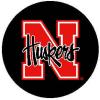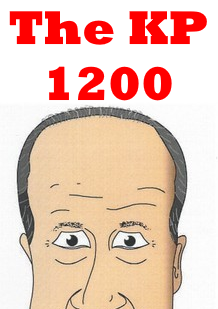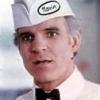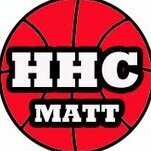Then & Now: Fred Hecox
Compiled By Dave Brandon
 Fred
Fred
Hecox played for Nebraska from 1945-1946, and was
coached by both the late A.J. Lewandowski (1941-1945,
24-63) and L.F. Klein (1945-1946 season, 7-13).
Hecox, a
5’10” point guard from Cozad, is our latest guest in
this Sunday's "Then & Now" feature.
HHC: Thanks
for joining us. Did you ever think you'd get an
interview about Nebraska basketball again?
FH: I sure didn’t. It’s been awhile, quite
awhile.
HHC: Well it’s
great to talk to you! What was your high school career
in Cozad like?
FH: Well, we weren’t state champions or
anything, but we won about 50%, I suppose, of our games.
HHC: How much
has basketball changed since back then?
FH: One of the big things is of course the
three-point shot. And they were very strict on us
palming the ball back then, and these guys get away with
murder today with that ball and changing directions.
They used to call us for palming the ball if you ever
rolled your hand over the ball, so that is a big one.
And of course the guys are so much better shooters than
we were.
HHC: What made you choose to play
basketball at Nebraska?
FH: I was going to dental school there at
the time, and I was in the service, but they sent me
back to Nebraska to complete my dentistry, and that’s
when I went out for basketball.
I remember going over and watching them practice, and
decided I could make the team, so I went down and talked
to the coach (A.J. Lewandowski) and he said, “Where were
you when we had tryouts?” And I said, “I was busy in
dentistry, and I’ve been watching you practice and I
think I can make the team.” So he tried me out, and I
ended up playing.
HHC: Your first season at Nebraska was
1944-1945, and the team went 2-17 (1-9, 6th), although
you did beat Kansas (home, 59-45). What do you remember
about that game?
FH:
Well, I guess it made it a successful season to beat the
Jayhawkers. I think they had Charlie Black back then,
but I can’t remember, for sure (Editors Note: They did).
He was the center for KU, and I think that’s right, but
I’m not sure. But Kansas was the best in our conference
back then, them and Oklahoma.
HHC: 1944-1945 was the last year for Coach
A.J. Lewandowski. Did you guys have a good idea that he
would be replaced at the end of the season, or did it
come as a surprise to you?
FH: Gosh, I don’t know what to think about
that. I guess we weren’t too surprised.
HHC: What was he like as a man?
FH: He was a fine fella. I don’t know how
good of a coach he was. You hate to knock anybody, but
we had cooperation with him. No dissention, and he was a
good man.
HHC: As a basketball coach, what did he
believe in?
FH: Well, we had the same stuff as today.
We ran a zone and man-to-man on defense. We did a lot of
rotations back and forth.
HHC: What came of him after he left
Nebraska, and when did he ultimately pass?
FH: He was a business manager, I think. He
became in charge of the tickets at the football stadium.
And I don’t know how long he was there, but at least two
or three years, I know. I don’t know what happened to
him after that.
HHC: 1945-1946
was your last year at Nebraska, and the team went 7-13
(3-7, T-4th) under first year coach L.F. Klein. What do
you remember most about that last year?
FH: I remember mainly after the season. I
had to decide if I was there to play basketball or go to
dental school. And, I knew I could never make a living
playing basketball, so I decided to pursue dentistry,
because I was spending so much time on the road and
missing so much class that it made it difficult to
complete my dentistry.
I was in
the Navy, assigned to Nebraska, and they would only give
me a 48-hour pass. And so sometimes we’d go by train on
our road trips, and I’d only be able to go to one game
before coming back.
HHC: Really?
So you’d miss one of the games and come back alone?
FH: Yeah. Sometimes we’d go down to Kansas
or Oklahoma, and it’d be two games, and I’d only be able
to go to one because of my pass.
HHC: Wow! I never knew that. Do you
remember where L.F. Klein came from, and what his
background with basketball was?
FH: Gosh, we used to call him “Pop Klein”.
I’m not just sure where he was from. Things were pretty
tough with the war on, and you just didn’t have coaches
like you normally had. And they just kind of filled in
for both football and basketball.
Sorry
I’m not much help for you.
HHC: No, you
are doing great!
FH:
One thing I do remember about Klein was that he just
kind of filled in. I think football was his main sport,
and they needed a basketball coach, so they put him in.
He was very well liked.
HHC: What was
the reason for him only serving as Head Coach for one
season?
FH:
I don’t know for sure. I think he was just more or less
filling in for that one year due to the hardships of the
war and us needing a coach.
HHC: What came
of him after he left Nebraska, and when did he
ultimately pass?
FH: I can’t remember. He was at Kearney
for a while, I know. Whether he was at Kearney first or
went afterward, I’m not sure, but I believe he was
there. I believe Nebraska was the only basketball job he
ever had, though.
HHC: Besides
missing some games on road trips, how did the war affect
college basketball for you?
FH: Well, of course you would be drafted,
and actually I enlisted in the reserves so I could
finish out the (second) year.
But
before I was at Nebraska, I went to Miami (Ohio) for my
pre-dental work, and then came back to the university
after I got into dental school.
That was
before basketball. I had a year of pre-dental at
Nebraska, and then I went back to Miami (Ohio) for three
semesters. So I started playing basketball after my
three semesters at Miami (Ohio).
HHC: So when
you decided to quit basketball, you could have played
longer?
FH: Yes. Actually, I had 2 or 3 more years of
eligibility, because they didn’t count the times you
were in the service. But like I said, I knew I couldn’t
make a living playing basketball, and so I just had to
tell coach I had to quit. So much of the work in
dentistry was demonstrations, and it was very difficult
to make it up, and then I had to go to class every
afternoon. So I’d be trotting up on the floor many times
and the coach would say, “Let’s call it a night.”
HHC: Which coach did you like playing for
more?
FH: Klein. I played more under him. I was
a reserve the first year. And the middle of the year, I
came up to the varsity. And the next year, I played
varsity the whole year. So I played more the second year
under Klein.
HHC: Talk about some of your teammates
from back then, and what kind of players they were?
FH: Well, there was Joe Brown, James
Sandstedt, Donald Barry, Gayle Lebsack, Bob Korte, Chuck
Mulvaney, Leo Schneider, and Robert Koenig. We didn’t
have a lot of height back then.
But
down low, Donald Barry was out of Norfolk, and he was
the center. Bob Korte also played center, and I think
Bob went on to Kearney after he played to the
university, and then was a referee in Arizona.
James
Sandstedt was a forward, and Joe Brown played both
forward and guard. Leo Schneider was from Iowa, and went
back and played for Iowa State after the war, and he
also played center. Chuck Mulvaney played power forward,
and he was a Benson Bunny, I can always remember that.
He was quite the character, and a very nice guy.
Gayle
Lebsack was out on the perimeter, and he was a good
shooter. I would say the same thing about Robert Koenig,
just a good shooter.
HHC: Did you stay in touch with any of
them after your times at UNL?
FH: Well, Joe Brown was in Lexington, and
I think he got hit by a train, but I’m not sure. So, I
didn’t have too much contact with most of them, because
most of them were out of state.
HHC: What was the biggest play or shot
that you made while at Nebraska?
FH: Oh gee. The one I remember most of
all, I went in for a lay-up with seconds to play at
Missouri during my first year (1944-1945). The game was
tied, we were in the second overtime, and I drove in for
a bucket, and they knocked me clear off of the floor,
and while I was waiting for them to call a foul, they
went down and scored a basket and I never got a foul
called, so we lost the game (February 17, 1945, Missouri
55-54, 2 OT).
HHC: Wow, that sounds like the officiating
Nebraska basketball still gets today.
FH:
(Laughs) Yeah.
HHC: What was it like playing in the
Coliseum?
FH: Well, that’s all we knew, so we didn’t
think of it as the barn until it got a few years later,
and it just kind of became the barn. It was just open,
and big. The fans were great. The home team always had
an advantage.
HHC: Was
basketball as popular as football back then?
FH:
No, I don’t think we ever were, and I don’t think it
ever will be. Of course that was before (Bob) Devaney,
so I could sit almost anywhere in the stadium, I can
remember that. Football was king, though, and of course
not like now, but it was still king.
HHC: What are
your favorite memories, both on and off the court?
FH:
I think playing basketball was the big thing.
One
funny thing is that I can remember some of the guys on
the team were older than just freshman, since they had
been in the service and were coming back. Some of them
smoked, and they used to get me to go talk to the coach
and keep him busy so they could get a smoke. And I was
supposed to talk to him and keep him busy so he didn’t
know about it (Laughs).
HHC: (Laughs)
Did they ever find out?
FH: No, he never found out (Laughs).
HHC: (Laughs)
That’s hilarious. What else do you remember?
FH:
I can remember playing in four overtime games, and we
didn’t win one. I don’t like to remember that so well
(Laughs).
HHC: (Laughs).
Finally, what have you been up to the last sixty years,
and where will we find you today?
FH: I’m in Cozad, Nebraska, and I’m a
retired dentist. I enjoy watching my grandsons play
ball. One of them plays for Kearney, and I did go to the
finals of the Class A Tournament. They had two wins, but
in the semifinals lost.
But
yeah, I practiced in Cozad, except for an interruption
in the Navy during the Korean War, when I went in as a
dentist, since I was in the reserve and they called me
up. And the rest of the time I’ve been in Cozad.
HHC: Would you
be able to take some e-mails from our readers if we tell
you how to check an e-mail account we’ll set up for you?
FH: Well, I’m illiterate on the computer.
So I wouldn’t be able to, I’m sorry.
HHC: Not a problem at all. Thanks a lot
for your time, and anything else you'd like to say or
add?
FH: Yeah, I
remember something else. There was a little guy from
Iowa who was an All-American, and I can’t think of his
name. But I remember playing against him and I asked
coach (L.F. Klein in 1945-1946) if I could just guard
him. And at the half, we were tied, and he only had 4
points and I had 5, but the problem was I had 4 fouls
(Laughs). So coach took me out, and I didn’t get back in
until there was about 10 seconds to play. And I hate to
say it, but he called my name, and I acted like I didn’t
hear it because I was so disgusted from not playing the
whole second half. We had been tied at halftime, and
then they blew us out the second half.
HHC: (Laughs)
Thanks a lot for the chat, this has been fun.
FH: Yeah.
Thanks for calling.
HHC:
No problem. Take Care.
FH: You too.<script type="text/javascript" language="javascript">





Recommended Comments
There are no comments to display.
Join the conversation
You can post now and register later. If you have an account, sign in now to post with your account.